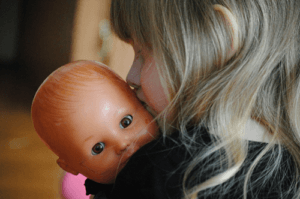Baby dolls are one of the classic toys that have stood the test of time. According to the documentation, the earliest use of dolls was in Greece around 100AD. Baby dolls have provided tons of fun for children from generation to generation. The designs and functions of the baby dolls are updated with the changes of the times, for example, you may see many different types of doll toys on the market like talking baby dolls, stroller baby dolls, dollhouses, Etc. Toddlers learn by playing, playing with baby dolls is one way for toddlers to gain a greater understanding of themselves as well as those around them. But there are more than that, here are the benefits of playing With dolls for toddlers.

Developing social-emotional skills
One of the important skills that toddlers learn when playing with dolls is social-emotional skills. Caring for their dolls teaches toddlers how to process emotions and learn to empathize with those around them. Research had shown that doll play can activate neural regions, even when children play by themselves. It provides an opportunity for children to develop empathy and compassion.
Develop language skills
While playing with dolls, children talk to their dolls using the vocabulary they heard from parents or caregivers. This is a way toddler practice their language skills. They will also run into new words when playing with dolls as well as their friends. They learn how to communicate with each other, strengthen their vocabulary by filling it with practical language.
Learn basic life skills
Doll play helps toddlers to understand the daily life event occur in their homes or care centers. They imitate adults to take care of their baby doll, get dressed them-putting on shorts and shirts, bathing their baby doll, feed them. They practice these life skills with their dolls and gradually master them and applied to their real life.
Spark imagination
Doll play is a type of pretend play. Imagined scenarios will be created when children play with dolls or other children. They will use their imagination to pretend to be a caregiver, use the things around them and imagine it to what they’ve been seen, for example, take a card box as their baby doll’s bed or use a towel as the sheet, etc. Playing with doll toys encourage children to spark imagination, allows them to model what they’ve seen or renact what’s been done to them or those around them.
Learn responsibility
Children learn important social skills by playing with dolls. They develop empathy during play, practice to comfort others. By taking care of a doll, children are learning responsibility as well. It helps them more readily understand how to care for siblings.
Encourage expression
A doll is more than just a toy for toddlers – they can also be a friend and companion. Doll play allows toddlers to express their feelings. They feel soothed when cuddling their ‘friend’. The pretend play environment encourages them to talk and interact with those around them. It helps develop young children’s confidence.
Last but not least, doll play is not just for a girl thing, a boy can own their baby doll. It is essential that positively offer doll play in children’s early years, which is beneficial for a child’s development and learning.
